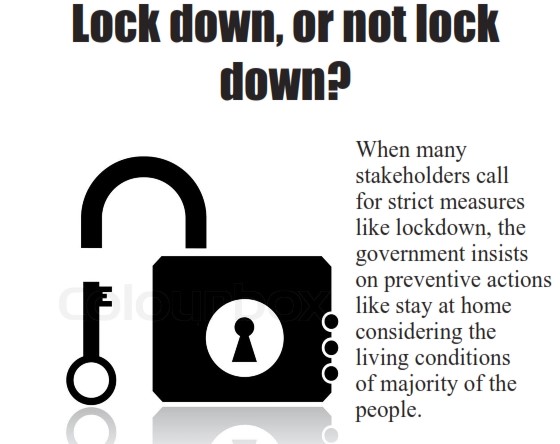
The government says that it is well aware of the importance of locking down urban areas to curb the spread of COVID-19. At the same time, it admits that such a step would not be easy for a country like Ethiopia, wherein a substantial number of population is still living under extreme poverty or with less income.
The Addis Ababa City Mayor, Engineer Takele Uma recently told the media how locking the city he administers will not be easy as one might assume. “Some 400,000 young people working in the construction sector alone would be affected if they are forced to stay at home,” he said. Economists approached by The Ethiopian Herald more or less share the concerns but suggest some important measures to address the challenge. Associate Professor at Addis Ababa University, Faculty of Business and Economics, Atlaw Alemu (PhD) says that unless the service as well as the trade sectors could be locked down, except those which are providing mandatory services like mill, transport, shops, and tailors, the transmission of the virus from one to the other might surge the spread of the virus at alarming rate.
He believes that if people could stay home and institutes could be locked down for a few weeks, the virus will stop spreading and we can then return to the normal conditions. But at the same time he believes that if people stop working, they will not have income; so that, they will not have concern to buy goods and commodities. Even if they need to purchase a product, they might face shortage of money in pocket. If the buyer do not show demand for products, the manufacturers will not produce and stop functioning; so that, they would not able to properly pay salary for workers.
Therefore, the impact is at both sides; the producer and the consumer, he underlined. If there is no free movement of people in the market due to fear of coronavirus, many people may face hunger, while the macro economic growth will suffer significant harm, Atlaw said.
As to him, to pass the challenges at this critical time, the manufacturers who produce basic necessities like food and drinks, medicine, healthcare equipment as well as those who provide basic services like mill and transport should not stop from their daily compulsory engagement. In addition to this, those who retail and those who engage in transporting these commodities should not stop functioning amid challenges, he added.
Moreover, those who are poor and vulnerable should be supported to get their daily minimum consumption since hunger is another headache for their survival, Atlaw noted. “Of course, the government, the people and other stakeholders are cooperating to provide support for the vulnerable. But, this should be done in a more comprehensive and coordinated manner.” Atlaw also said: “No one should be left in the fight against coronavirus.
Street people, elders, and jobless citizens have to be supported either financially or psychologically since they are the most vulnerable part of the society.” To make this happen, there should be organized groups who can coordinate such supporting mechanisms in each and every village and district, he emphasized. “
Apart from preparing quarantine places for victims, it is also necessary to look around poor and disabled people in villages before they are infected by virus while they are rushing to get food and other basic necessities.” Wondaferahu Mulugeta (PhD), Associate Professor at Meles Zenawi Academy, for his part said that the national economic growth is now at risk since exporters and importers could not operate properly following the locked down in several countries due to the spread of coronavirus.
Agreed with Atlaw on the consequences of the pandemic over the economy, Wondaferahu indicated that the first thing to take action at this time is restricting the spread of the virus before serious damage in the overall socio-economic growth. He also commented that the government needs to provide support for such disadvantaged sectors in the form of concessional loans, slashing interest rates, and provision of grace period for repaying debts as in other countries. Wondaferahu also advised that huge financial injection for manufacturing companies is the sole alternative to help them survive, produce more products and again to get into the market competitively. Ermias Ashagrie, Bahir Dar University, Faculty of Business and Economics, similarly says that facilitating financial provision and other basic necessities for the needy and elderly people is a must to curtail the common challenge for common benefits.
As to Ermias, strong cooperation between the government, the society and other stakeholders is a must to get out of this economic crisis. The three economists agree that the spread of the coronavirus will affect the economic growth; increase unemployment; decrease import and export trade; upsurge inflation; decrease household income from remittance. Under the existing global health crisis, they say, government action may not be enough to stop the decline.
The government, the society, and all pertinent stakeholders need to work hand in gloves to get out the challenges for mutual benefits, they advised. Once the crisis is over, there should be other major mechanisms to continue as a nation. Atlaw suggests that banks have to give grace period for borrowers to repay loans and slash interest rates; even to cancel debts; the government should also give grace period for tax payers and need to provide loans for those impoverished sectors due to this global health crisis. Atlaw finally professed that concerted efforts of all stakeholders are required at this global health crisis; otherwise, unemployment will increase, import and export will decline, inflation will rise, and incomes from remittance will also decrease.
The Ethiopian Herald April 11/2020
BY ZELALEM GIRMA





